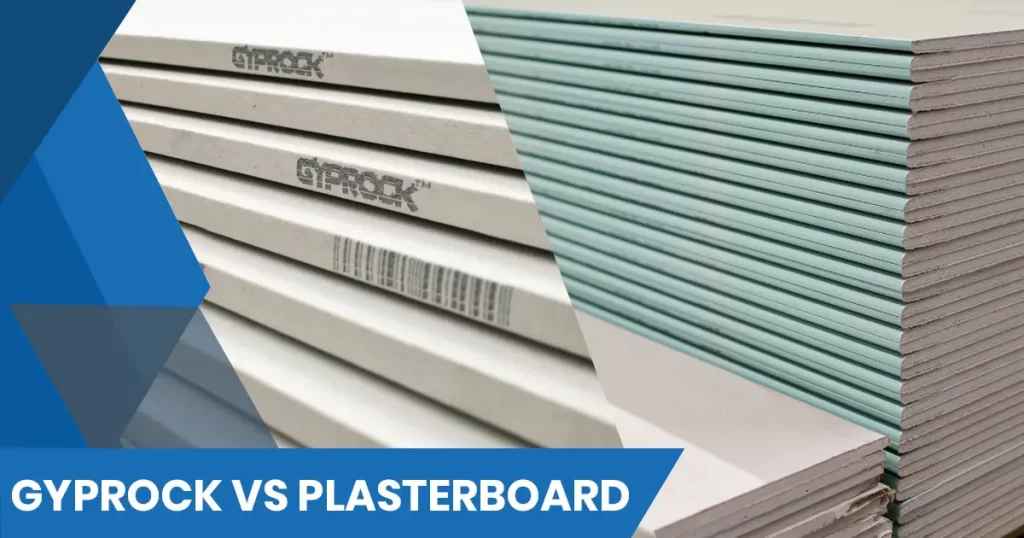
Some people make the mistake of thinking Gyprock is a different material from general plasterboard. That’s not actually true.
Gyprock is just a particular brand of plasterboard, much the same way Esky is a brand of portable cooler. Gyprock is a reliable brand and a market leader such that the name itself has become synonymous with plasterboard in Australia. People often refer to any plasterboard as ‘Gyprock’ regardless of the actual manufacturer.
This phenomenon, where a brand name becomes a generic term for a type of product, highlights the impact Gyprock has had in the construction and building materials industry. This is a testament to the brand’s strong market presence and reputation for quality.
So, is there any difference between Gyprock and plasterboard? No, there isn’t. Well, maybe there is, but it only comes down to quality.
Gyprock Plasterboard Qualities
Gyprock plasterboard stands out in the construction industry for its superior qualities that make building and renovating easier and more efficient.
Here are some of the key qualities of Gyprock plasterboard:
1. Lightweight
Gyprock is known for its lightweight nature, which not only makes it easier to handle, transport, and install but also reduces the load on building structures. This can be particularly advantageous in large projects where ease of movement and quick plasterboard installation are crucial.
2. Durability
While slightly more lightweight than some plasterboards, Gyprock still maintains a level of durability that supports everyday wear and tear. This makes it a reliable choice for creating walls, ceilings, and partitions.
3. Cutting-Friendly
Cutting and shaping Gyprock is easy, thanks to its manageable weight and consistency. Whether using simple hand tools or more advanced cutting equipment, ceiling contractors find Gyprock to be less cumbersome.
4. Improved Soundproofing
One of the standout features of Gyprock is its ability to effectively reduce noise transmission between rooms. This quality is especially valuable in multi-residential buildings or offices where sound insulation is important.
5. Improved Moisture Resistance
Gyprock offers specific varieties that are designed to resist moisture and prevent mould growth. It’s an excellent choice for areas prone to humidity, such as bathrooms and basements. This adds a layer of protection and longevity to structures in moisture-rich environments.
Cost Considerations
Cost is a crucial factor when deciding between Gyprock and standard plasterboards.
Generally, standard plasterboard is more affordable than Gyprock. This is a more appealing choice for homeowners on a budget or for larger construction projects where keeping costs down is vital.
However, in general, Gyprock has better quality than standard plasterboards. Gyprock has improved durability and fire resistance, which might justify the higher expense.
So, it’s essential to weigh the specific needs of your project.
We Use Gyprock for Ceilings and Walls
When it comes to quality ceilings and walls, our Perth ceiling contractor team relies on Gyprock plasterboard for every project. Known for its durability and ease of use, Gyprock ensures a smooth, professional finish every time.
Whether you’re facing issues with your current plasterboard or looking to install new Gyprock ceilings or walls, we’re here to help.
If you’re planning a renovation or building from scratch, don’t hesitate to get in touch. Our experienced team is ready to bring top-quality workmanship to your Perth property. Reach out today—let’s make your space something special with Gyprock!
Reviewed by
Aaron Kumar
Aaron Jefferson Kumar. The owner and operator of Perth Ceiling and Walls. With hands-on expertise in plasterboard ceiling and wall repairs and installations, Aaron takes pride in ensuring every project meets the highest standards of quality and craftsmanship. His direct involvement in both the business and the fieldwork positions him as a trusted person on all things related to ceiling and wall solutions.
